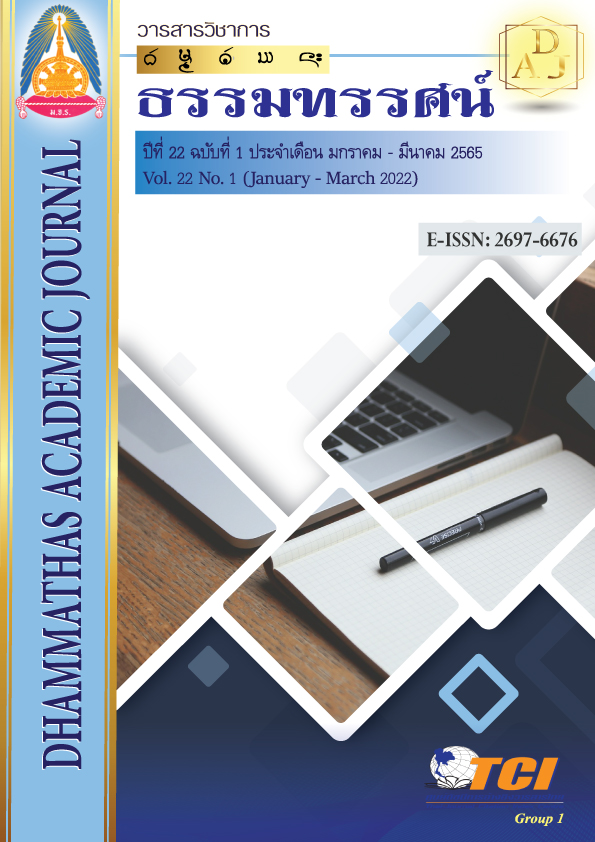การเมืองการปกครองในแนวพระพุทธศาสนา
Main Article Content
บทคัดย่อ
การวิจัยครั้งนี้ มีวัตถุประสงค์เพื่อ 1) ศึกษาสภาพสังคมและการเมืองสมัยพุทธกาล 2) ศึกษาการกำเนิดสังคมรัฐแนวพุทธ 3) ศึกษาหลักการปกครองแบบธรรมรัฐแนวพุทธ เป็นการวิจัยเชิงคุณภาพ (Qualitative research) ซึ่งเน้นการวิจัยทางเอกสาร (Documentary research) โดยศึกษาข้อมูลจากพระไตรปิฎก อรรถกถา ฎีกา อนุฎีกา ปกรณ์วิเสส หนังสือ ตำรา บทความ เอกสารและงานวิจัยที่เกี่ยวข้อง มีการวิเคราะห์ข้อมูล แล้วนำเสนอผลการวิจัยในรูปแบบของการพรรณนาวิเคราะห์ ตามวัตถุประสงค์การวิจัย
ผลการวิจัยพบว่า
1. สภาพสังคมในสมัยนั้นที่ถูกอิทธิพลความเชื่อทางศาสนาพราหมณ์ครอบงำไว้ได้เป็นส่วนใหญ่ พราหมณ์จึงเป็นกลุ่มวรรณะที่กุมอำนาจทางด้านความคิด การศึกษา การเมือง สังคม การปกครองและเศรษฐกิจ รวมทั้งประเพณีวัฒนธรรมไว้ แล้วกำหนดบทบาทหน้าที่และสิทธิทางสังคมขึ้นเองทั้งหมด ทำให้เกิดเรื่องวรรณะ 4
2. ความขัดแย้ง การทะเลาะวิวาท และการเอารัดเอาเปรียบกันในหมู่มนุษย์ เป็นเหตุสำคัญที่ทำให้เกิดความจำเป็นที่จะต้องมีผู้นำ ผู้ปกครอง มีผู้ใต้ปกครองจนก่อรูปร่างเป็นรัฐในที่สุด ซึ่งเป็นการกำเนิดสังคมรัฐแนวพุทธในอัคคัญญสูตร
3. พระพุทธศาสนาแบ่งหลักการปกครองข้างต้นออกเป็น 3 ลักษณะ แต่การปกครองทั้งแบบอัตตาธิปไตย และโลกาธิปไตยนี้ ย่อมถือหลักธรรมาธิปไตยเป็นหลักประกอบด้วยเสมอการแบ่งลักษณะการปกครองออกมาเช่นนี้ เพียงแบ่งตามระดับขั้นจริตสภาวะความถนัดของผู้ใช้ (ผู้ปกครอง) แต่ละบุคคล หรือตามแต่สถานการณ์ สถานที่ ชุมชน และสิ่งแวดล้อมที่เกี่ยวข้องนั้น อันมีลักษณะแตกต่างกันเท่านั้น
Article Details

อนุญาตภายใต้เงื่อนไข Creative Commons Attribution-NonCommercial-NoDerivatives 4.0 International License.
เพื่อให้เป็นไปตามกฎหมายลิขสิทธิ์ ผู้นิพนธ์ทุกท่านต้องลงลายมือชื่อในแบบฟอร์มใบมอบลิขสิทธิ์บทความ ให้แก่วารสารฯ พร้อมกับบทความต้นฉบับที่ได้แก้ไขครั้งสุดท้าย นอกจากนี้ ผู้นิพนธ์ทุกท่านต้องยืนยันว่าบทความ ต้นฉบับที่ส่งมาตีพิมพ์นั้น ได้ส่งมาตีพิมพ์เฉพาะในวารสาร วิชาการธรรม ทรรศน์ เพียงแห่งเดียวเท่านั้น หากมีการใช้ ภาพหรือตารางของผู้นิพนธ์อื่นที่ปรากฏในสิ่งตีพิมพ์อื่นมาแล้ว ผู้นิพนธ์ต้องขออนุญาตเจ้าของลิขสิทธิ์ก่อน พร้อมทั้ง แสดงหนังสือที่ได้รับการยินยอมต่อบรรณาธิการ ก่อนที่บทความจะได้รับการตีพิมพ์เอกสารอ้างอิง
กรมการศาสนา กระทรวงศึกษาธิการ. (2530). พระไตรปิฎกภาษาไทย ฉบับสังคายนา. กรุงเทพฯ: การศาสนา.
จำนง ทองประเสริฐ. (2520). แบบเรียนศาสนาสากล. กรุงเทพฯ: ไทยวัฒนาพานิช.
นรี ภวกานตานันท์. (2538). การเมืองการปกครองในแนวพุทธศาสนา: ศึกษาจากนักคิดและพระไตรปิฎก. (วิทยานิพนธ์รัฐศาสตรมหาบัณฑิต). กรุงเทพฯ: จุฬาลงกรณ์มหาวิทยาลัย.
_______. (2540). ทรรศนะทางการเมืองของพระพุทธศาสนา. กรุงเทพฯ: สามัคคีสาส์น.
พุทธทาสภิกขุ. (2523). เมื่อธรรมครองโลก. คำบรรยายประจำวันเสาร์ภาคอาสาฬหบูชา 2519 ณ ลานหินโค้งสวนโมกขพลาราม สุราษฎร์ธานี. กรุงเทพฯ: พระนคร.
พระมหาเวชยันต์ กิตติโสภโณ (แก้วพวง). (2544). การปกครองแบบธรรมรัฐแนวพุทธศาสนาเถรวาทกับการปกครองแบบอุดมรัฐของเพลโต: การศึกษาเปรียบเทียบ. (วิทยานิพนธ์ศาสนศาสตรมหาบัณฑิต). นครปฐม: มหาวิทยาลัยมหามกุฏราชวิทยาลัย.

